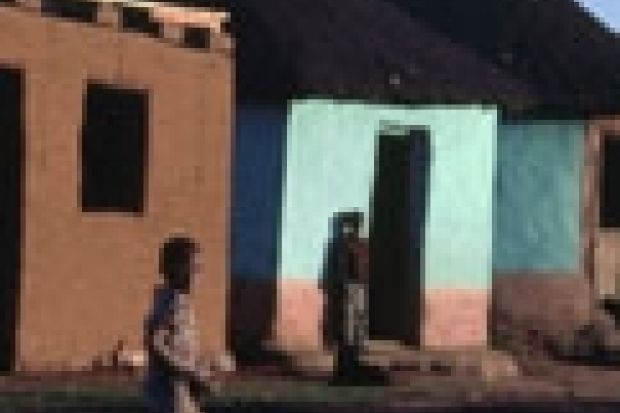Historically black universities in South Africa have been haemorrhaging students, staff and money, several have suffered management and financial crises, and one - Transkei - is so deep in debt that it may have to close.
Nicky Morgan, administrator of the University of the Transkei (Unitra), has imposed drastic belt-tightening measures in an attempt to save the institution.
The most severe step has been losing 476 staff - 44 per cent of the total number - in just two years. Some 192 took voluntary severance last year and the rest retrenched a few months ago. The overwhelming majority were support staff: only 28 academics were lost.
Most of the university's state subsidy has been eaten up servicing its overdraft. But Professor Morgan said: "I believe we can save the university. We have done as much as we can for this financial year, moving from a projected overdraft of R119 million (£10 million) by March 2002 to one of R78 million, including R8 million for strategic maintenance and security."
The 4,500-student university in Umtata - capital of the Transkei former homeland and one of South Africa's poorest and most barren areas - has a budget of R170 million, of which R114 million is state subsidy. It also owes millions in taxes and pensions.
Reports of the threat to Unitra prompted an outcry, including from the World Health Organisation. The organisation, which is setting up a centre for medical education at the university, said closure would be a "devastating blow" to Eastern Cape and its efforts to uplift communities.
In an independent report on Unitra this year, Adam Habib wrote that the university was crucial to Umtata: it and the local council are the biggest job providers. "If Unitra dies, the city collapses."
Last month, students joined the campaign to save the institution. The Students Representative Council vowed to help collect student debts that total more than R80 million - and are a significant contributor to its financial headaches. Current students' debt is R44 million, while former students owe R39 million.
Professor Morgan had warned a mass meeting of students that the university might be forced to suspend activities in November unless students paid their debts. Unitra spokesperson Karuna Krishanlal-Gopal said at the time:
"Right now, the last resource we have is student fees."
SRC president Webster Mbeni said: "We have undertaken to help find ways to get the institution out of this quagmire. We have committed ourselves to encouraging and assisting one another to pay fees." Unitra, however, would have to extract fees from former students.
Professor Morgan blames overstaffing, "disastrous" funding decisions, declining student numbers and growing student debt for Unitra's crisis. Its vice-chancellor was suspended for mismanagement two years ago and the government appointed an administrator to pull Unitra out of the mess. Professor Morgan is its second administrator.
Mr Habib wrote that, as with some other historically black institutions, post-apartheid brought for Unitra "a vicious cycle of student strikes, political instability, falling enrolments and high failure rates, declining subsidies and ultimately financial bankruptcy".
Historically, Professor Morgan said, "the university was quite flush with money", dispelling the myth that all historically black institutions were underfunded. "Whenever Unitra suffered financial problems it told the homeland government, which paid up. It never faced a deficit."
Now, universities have to be frugal and accountable with public funds. Also, like Fort Hare, the university was seen as something of a job-creation project, resulting in gross over-staffing. "It had 12 tractor drivers for three tractors, for instance."
One of the most disastrous funding decisions was taken by the former vice-chancellor, who paid for major capital projects - much-needed student residences and a new library - out of Unitra's operating budget, sparking a liquidity crisis.
Student numbers at Transkei dropped 46 per cent between 1996 and 2000, to a low of 3,800. This year's 4,500 intake is encouraging. There is 60 per cent unemployment in Transkei. Average household expenditure is about R18,000 a year, while fees are R8,000, and fee collection is problematic because people have nothing.
Professor Morgan believed that Unitra could be run on R80 million of its annual state subsidy, enabling the university to pay off its debts in four years. Whether it manages to or not may become a moot point if education minister Kader Asmal's working group, investigating institutional mergers, suggests one with Rhodes and Fort Hare, which are also in the Eastern Cape.
Professor Morgan would rather see the university sort itself out. "The best solution to Unitra's problems is going to be found here in the Transkei, not by a minister in Pretoria," he said.
Register to continue
Why register?
- Registration is free and only takes a moment
- Once registered, you can read 3 articles a month
- Sign up for our newsletter
Subscribe
Or subscribe for unlimited access to:
- Unlimited access to news, views, insights & reviews
- Digital editions
- Digital access to THE’s university and college rankings analysis
Already registered or a current subscriber?
